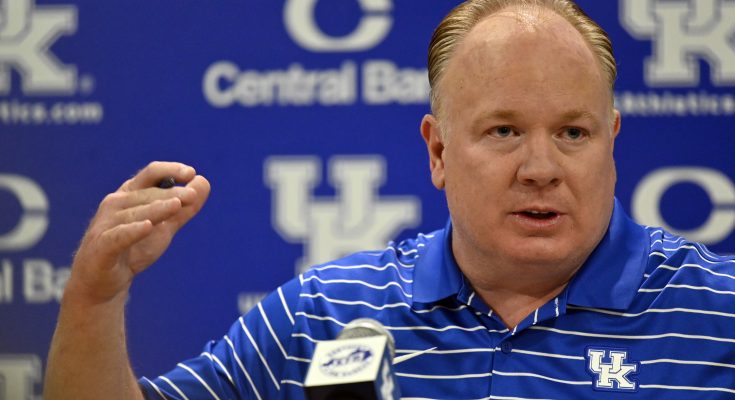It’s hard to overstate just how much Vince Marrow has meant to the University of Kentucky football program over the past decade. Known to many as “Big Dog,” Marrow has served as associate head coach, recruiting coordinator, and tight ends coach for the Wildcats under head coach Mark Stoops. The two men share a bond that goes far beyond the sideline — they’ve been friends for years, even before their time in Lexington began. That’s why, when rumors began to swirl about Marrow potentially leaving Kentucky to take a job at in-state rival Louisville, people across the Bluegrass State held their breath. And when Mark Stoops was finally asked to address those rumors directly, his response was equal parts measured, insightful, and deeply human.
There’s a reason people care so much about this story. College football is more than just a game in Kentucky; it’s a culture, a way of life. For many years, Kentucky football lived in the long shadow of basketball, but with the rise of the Stoops era and the tireless recruiting of Marrow, the program carved out a place of prominence in the SEC. Losing Marrow wouldn’t simply be about one coach taking a new job. It would feel like a foundational pillar being pulled out from underneath the program — and to a rival school, no less. So naturally, when Coach Stoops was asked about the reports, fans and media alike hung on every word.
Stoops, never one to offer hyperbole or emotional soundbites, handled the moment with his characteristic calm. He acknowledged the rumors without fueling the fire. He didn’t confirm anything prematurely, nor did he dismiss the possibility out of hand. Instead, he gave insight into the relationship he has with Marrow, the nature of the business of college football, and the importance of mutual respect between professionals who’ve spent years working together for a common goal.
Stoops made it clear that he understands how the coaching carousel works. Opportunities come and go. Jobs are offered and considered. And even among close friends, career decisions sometimes lead people down divergent paths. But what mattered more than anything else to Stoops was that any decision be made respectfully — not just between him and Marrow, but with respect to the players, the program, and the fans who have put so much of their trust in both men.
It’s important to understand who Vince Marrow is in this equation. He’s not just a recruiter or a positional coach. He’s the guy who made Kentucky relevant in the living rooms of five-star high school athletes from Ohio, Michigan, and beyond. He’s the guy who helped build the “La Familia” culture at UK — a culture based on loyalty, honesty, and shared purpose. Marrow’s roots run deep in Ohio football circles, and his credibility with recruits, their families, and high school coaches is second to none. If you ask anyone close to the Kentucky program, they’ll tell you plainly: you don’t replace Vince Marrow. You just don’t.
That’s why the idea of Marrow joining the staff at Louisville — Kentucky’s archrival in every conceivable way — hits so hard. It’s not just about geography. It’s not just about conference alignment or recruiting battles. It’s personal. This is a rivalry laced with decades of animosity, pride, and emotional investment from players and fans on both sides. If Marrow were to walk away from Kentucky and suit up in red and black, the symbolic weight of that move would echo far beyond the football field.
Still, Stoops refused to take the bait when asked about feeling betrayed or disappointed. Instead, he focused on respect. Respect for what Marrow has done. Respect for the decisions every coach has to make. And, perhaps most importantly, respect for the players who need stability and clarity in a sport already filled with uncertainty. Stoops reminded reporters that he and Marrow have been through a lot together — highs and lows, big wins and heartbreaking losses. That kind of shared history doesn’t get erased by a single job offer. If Marrow chose to stay, it would be welcomed. If he chose to leave, Stoops would wish him well, even if it stung.
That level of maturity and perspective is part of what has made Stoops one of the most respected coaches in the country. He’s built a winning program in one of the toughest conferences in America without cutting corners, without scandal, and without sacrificing the values he preaches. Part of those values includes empowering his staff to grow and make decisions that are right for their families and careers — even if it means losing a close friend and colleague to a rival.
As for Marrow himself, he has yet to make a public statement at the time of Stoops’ interview. But anyone who has followed his journey knows that the decision isn’t simple. Marrow has deep ties to the University of Kentucky. His family is embedded in the Lexington community. He has helped develop dozens of young men into NFL-ready talent and has forged lifelong bonds with the athletes and staff members he’s worked alongside. At the same time, the Louisville job — if the rumors are true — represents a new challenge, potentially a promotion, and a chance to build something new under Jeff Brohm, a coach known for innovation and energy.
That’s what makes this situation so fascinating from a broader, more educational perspective. It’s a case study in the dynamics of coaching loyalty versus professional advancement. In many ways, college football mirrors life: relationships matter, decisions are complex, and timing can change everything. Marrow’s potential departure forces fans to confront the uncomfortable truth that sometimes, even the most loyal figures in sports may reach a crossroads. And when that happens, no amount of emotional attachment can override what someone believes is best for them and their future.
It also underscores how important communication is within a successful program. Stoops’ comments reflected not just personal sentiment, but leadership. He didn’t shy away from addressing the elephant in the room, and he did so in a way that acknowledged the emotional undercurrent without indulging in drama. That’s the kind of clarity and stability that players look to in their head coach. In an era where the transfer portal and NIL have added layers of complexity to college football, maintaining a clear and steady voice at the top is more important than ever.
This whole situation also sheds light on the strategic dimensions of recruiting and coaching in today’s college football landscape. Vince Marrow has been the linchpin of Kentucky’s recruiting success for years, especially in the Midwest. If he were to take that network and influence to Louisville, the balance of power in recruiting battles within the state — and perhaps even regionally — could shift. That’s not just speculation; it’s grounded in the reality of how vital relationships and reputation are when it comes to signing top-tier talent. Players commit to coaches as much as they do to schools. And losing a recruiter of Marrow’s caliber to a rival would likely mean more than just a change on the coaching staff. It could influence signing classes for years.
At the same time, it’s worth considering that Kentucky has become a more stable and attractive program under Stoops’ leadership. Even without Marrow, the infrastructure that has been built remains intact. Facilities have improved. National respect has grown. NFL Draft success continues to bring visibility. That’s a credit to the entire coaching staff and to Stoops’ vision. So while losing Marrow would certainly hurt in the short term, it wouldn’t necessarily spell doom for the program. What it would do is force Stoops to recalibrate, to find new voices, and to perhaps evolve the staff’s approach to recruiting and development.
If Marrow stays, on the other hand, it would be yet another sign of the unshakable loyalty that has helped Kentucky football defy expectations. It would reinforce the “family” culture Stoops and Marrow often speak about. And it would give fans a reason to believe that relationships still matter in a world increasingly shaped by money and career mobility. Either way, the story resonates because it touches on fundamental human themes — loyalty, ambition, respect, and identity.
Mark Stoops was asked a difficult question. And he answered it in a way that did justice not only to his relationship with Vince Marrow but to the principles of leadership and integrity. Whatever happens next, Stoops’ words will stand as a reminder that college football is about more than Xs and Os. It’s about people. And when those people make decisions, the best leaders support them — even when it hurts. That’s what Stoops did. And that’s why, no matter what choice Marrow ultimately makes, Kentucky football will keep moving forward — with grace, with grit, and with a deep understanding of what truly holds a program together.



